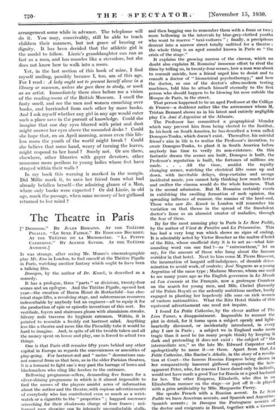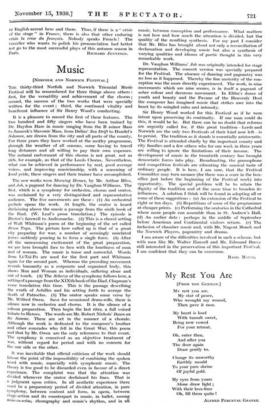The Theatre in Paris
[" DONOGOO ." BY JULES ROMAIM. AT THE THEATRE PIGALLE. LE SEXE FAIBLE." BY EDOUARD BOURDET. AT THE THEATRE DE LA MICHODI ARE. "LA PETITE CATHERINE." BY ALFRED SAVOIR. AT THE THEATRE AvroiNg.] IT was strange, after seeing Mr. Munro's cinematographic play Mr. Eno in London, to find oneself at the Theatre Pigalle in Paris, watching another fantasy which ought to have been a talking film.
Donogoo, by the author of Dr. Knock, is described as a comedy.
It has a prologue, three "parts" or divisions, twenty-four scenes and an epilogue. And the Theatre Pigalle, opened last year—the creation of Baron Henri de Rothschild—has elec- trical stage-lifts, a revolving stage, and subterranean resources indescribable by anybody but an engineer—all to equip it for the production of epic or episodic inventions of this sort. Its vestibule, foyers and staircases gleam with aluminium streaks. Silvery rods traverse its hygienic entrance. Within, it is painted to resemble a freshly cut beetroot salad. Anything less like a theatre and more like the Piccadilly tube it would be hard to imagine. And, in spite of all the trouble taken and all the money spent on house and play, one is forced to admit two things.
One is that Paris still remains fifty years behind any other capital in Europe as regards the conveniences or amenities of play-going. For beetroot-red and " metro " decorations can- not conceal from us that here, as in the older Parisian theatres, it is a torment to fight one's way past the barrage of bores and blackmailers who cling like leeches to the entrance.
Bellowing programme-sellers, demanding five francs for a silver-shining programme in which is it almost impossible to find the names of the players amidst acres of information about the author and the theatre, with copious advertisements of everybody who has contributed even so much as a wrist- watch or a cigarette to the " properties " ; haggard ouvreuses screeching for their cloakroom charge of four francs ; uni- form rsi men showing one to intensely uncomfortable stalls. and then begging one to remember them with a franc or two ; more bellowing in the intervals by blue-grey-clothed youths who want to reserve " taxi-voitures " ; finally, a precipitous descent into a narrow street totally unfitted for a theatre : the whole thing is an aged scandal known in Paris as the crisis of the stage."
It explains the growing success of the cinema, which no doubt also explains M. Romains' immense effort to rival the films by telling us, in twenty-four scenes, how a man was about to commit suicide, how a friend urged him to desist and to consult a doctor of " biometrical psychotherapy," and bow the doctor, or one of the doctor's ultra-modern testing machines, told him to attach himself eternally to the first person who should happen to be blowing his nose outside the Mosque de Paris, in the street.
That person happened to be an aged Professor at the College de France—a dodderer rather like the astronomer whom M. Tristan Bernard shows us in his latest and entirely negligible play Un Anti d'Argentine at the Athenee.
The Professor has committed a geographical blunder which may prevent him from being elected to the Institut.. In his book on South America, he has described a town called Donogoo-Tonka, which doesn't exist. Thereafter, his suicidal friend's aim in life is to realize the Professor's invention, to create Donogoo-Tonka, to plant it in South America before anybody has time to verify its non-existence. On this fantastic dream the scenes are built, Donogoo is built, the Professor's reputation is built, the fortunes of millions are made. . . . All the time, amidst the rapidly changing scenes, watching the electrical lifts come up and down, with inevitable delays, drop-curtains and savage incidental music, you cannot help thinking how much better and swifter the cinema would do the whole business. That is the second admission. But M. Romains certainly excels in exhibiting the swelling formation of mob opinion, the spreading influence of rumour, the manias of the herd-soul. Those who saw Dr. Knock in London will remember his variation on that theme in the spread of the fraudulent doctor's fame as an alarmist creator of maladies, through the fear of them.
By far the most amusing play in Paris is Le Sexe Foible; by the author of Vient de Paraitre and La Prisonniere. This has had a very long run which shows no signs of ending. It is admirably acted by Victor Boucher as the maitre d'hotel of the Ritz, whose unofficial duty it is to act as—what fair- sounding word can one find ?—as " entremetteur," let us say, for the amours of those who hang about the famous corridor in that hotel. Next to him come M. Pierre Brasseur, the incarnation of languid self-indulgence, of dronish deter- mination to avoid work, of veulerie; Jose Noguero as a young Argentine of the same type ; Madame Moreno, whom one used to see many years ago as the English governess in Le Monde oil l'on s'ennuie at the Francais, now a grotesque Countess on the search for young men, and Mlle. Cheirel (formerly of the Palais Royal) as the ardently ambitious mother, busily engaged in planting her hopelessly idle sons on rich women of various nationalities. What the Ritz Hotel thinks of this equivocal advertisement one need not inquire.
I found La Petite Catherine, by the clever author of The Lion Tamer, a disappointment. Impossible to recount the plot in detail, for it turns upon a subject openly and light- heartedly discussed, or incidentally introduced, in every play I saw in Paris ; a subject we in England make more tragic than it need be (so many people think) by keeping it dark and pretending it does not exist : the subject of " the intermediate sex," as the late Mr. Edward Carpenter used apologetically to name it—or them. Apart from that, La Petite Catherine, like Racine's Athalie, in the story of a revolu- tion at Court—the famous Russian Empress being shown in her comparatively innocent girlhood suppressing the heir- apparent Peter, who, for reasons I have dared only to indicate, would not have made a good Tsar for Russia or a good husband for her. The other Empress, Elizabeth, who dies in an Elizabethan manner on the stage—or just oft It—is played with a grim artificiality by Mlle. Marguerite Pierry. She speaks French with a Russian accent. In Le Sere Foible we have American accents, and Spanish and Argentine- Spanish accents ; in Donogoo the Portuguese accents of the doctor and emigrants in Brazil. together with a German
or English accent here and there. Thus, if there is a" crisis of the stage " in France, there is also that other enduring crisis la crise du francais. Nobody speaks French ! The traveller who wants to polish his pronunciation had better not go to the most successful plays of this autumn season in









































 Previous page
Previous page